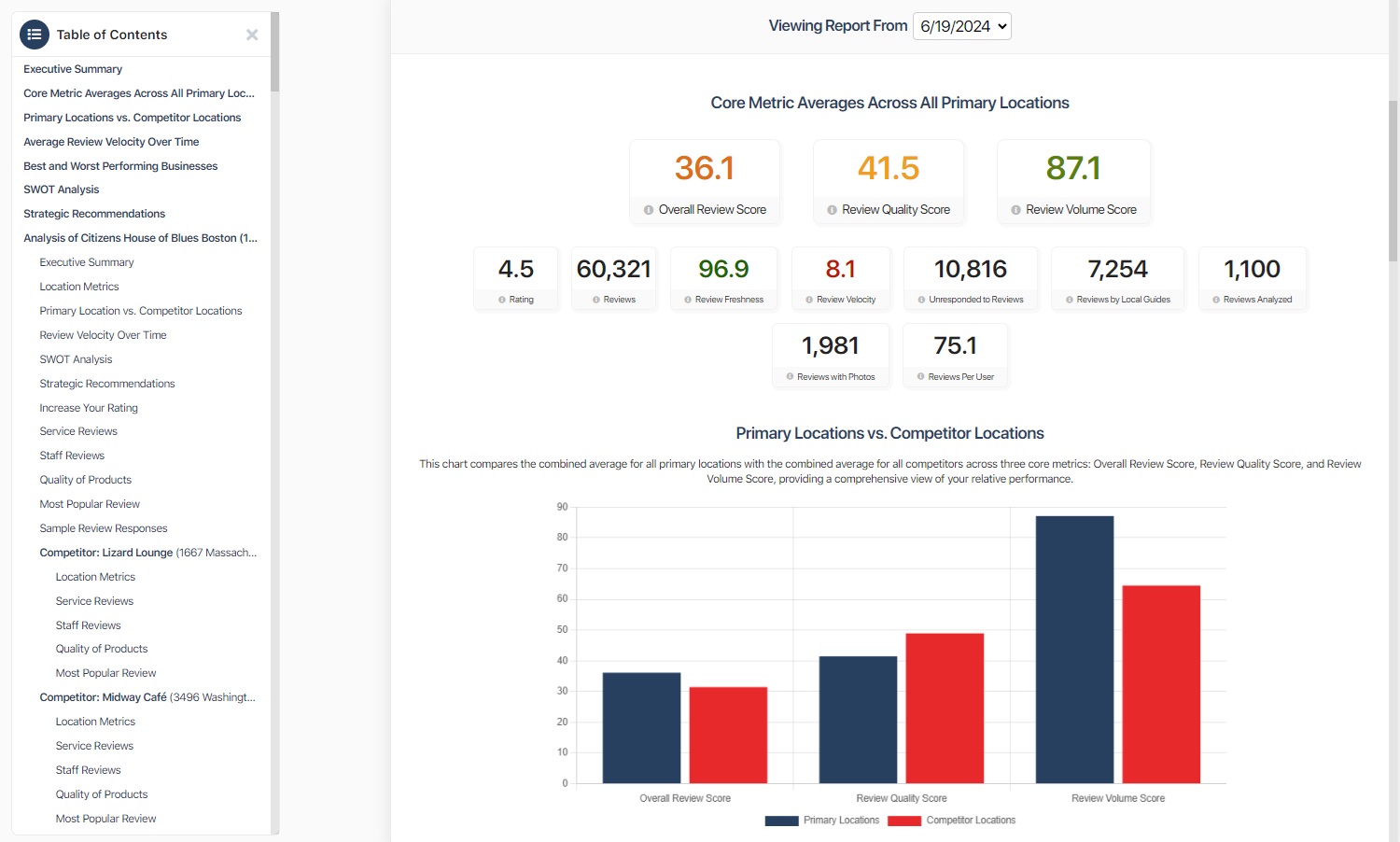Google Reviews Analysis

Sentiment Analysis for Google Reviews
Google Reviews play a key role in local search rankings. Improving your reviews can significantly boost your local SEO.
The process of sentiment analysis involves reading through reviews to extract valuable insights. The goal is to help you enhance products, services, customer experience and overall operations. Understanding sentiment and making changes as a result leads to better reviews, higher local search rankings, and a stronger business overall.
However, doing manual sentiment analysis for Google reviews is incredibly demanding and time consuming — but not if you let Local Falcon's AI do the work for you!
AI-Powered Google Review Analysis
Local Falcon's Reviews Analysis Reports use AI to analyze thousands of Google Reviews, reading reviews of your business and those of your competitors! Whether you have one location or hundreds, you'll get an executive summary of overall sentiment, detailed metrics, a SWOT analysis, suggested changes, and more.
New Metrics
The Reviews Report even introduces new metrics designed to uncover why some listings outrank competitors with lower star ratings and review counts. Some of the key metrics are outlined below.
Key Metrics in Reviews Analysis Reports:
- Overall Review Score: Represents the overall strength of a business's online reputation
- Review Quality Score: Focuses on qualitative aspects, like star rating.
- Review Volume Score: Evaluates quantitative aspects, like total number of reviews.
- Star Ratings & Count: See the distribution of your star ratings.
- Review Freshness: Gauge how recent your reviews are.
- Review Velocity: Monitor the rate at which new reviews are coming in.
- Unresponded Reviews: Identify reviews that need a reply.
- Reviews by Local Guides: Recognize reviews from influential users.
- Reviews with Photos: Know how many reviews include visual content.

Multi-Location Analysis of Google Reviews
Local Falcon's AI Reviews Analysis Reports provide outsized benefits for multi-location businesses, summarizing sentiment and opportunities across all locations (for up to 250 locations in a single report) and offering valuable insights into which ones are performing best and worst.
This tool allows multi-location businesses to easily identify the locations that need the most attention, making it easy to prioritize business optimizations that will provide the most immediate benefits, both for your customers and your local SEO strategy. Don't get us wrong, the reports also have lots of great information for single location businesses as well!
Online Review Analysis for Top Competitors
Local Falcon's analysis of online reviews doesn't stop at analyzing reviews for businesses you manage, either — the AI also looks at your top three competitors, providing a high-level overview of what they're doing better or worse than you.
This lightning-fast competitive analysis identifies specific opportunities and threats related to competitors, helping you more easily see what needs to be done to stand out among the competition and improve your business's position in local search.
Maximizing Reviews Analysis Reports for Different Use Cases
- Agencies, SEO, marketing, and analytics professionals, and listing managers: Get all of the important metrics, and perform sentiment analysis in a fraction of the time, gaining valuable insights into clients' business performance, comparing competitors, and identifying opportunities to improve reviews and rankings.
- Multi-location businesses, enterprise organizations, SMB's and service-area businesses (SABs): Analyze customer reviews for as many locations as you want, helping you optimize your business where it's needed most and identifying what changes may be needed in order to outrank competitors in local search.
- C-Suite executives, B2B and B2C businesses, and government organizations: Get an in-depth summary of how your organization is performing in the eyes of your customers, allowing you to better understand its strengths, weaknesses, opportunities, and threats.
- Sales professionals: Collect valuable market intelligence on leads and their competitors to more effectively personalize outreach and demonstrate the potential value of your services to prospects, ultimately helping you convert more leads into loyal customers.
<< Back to Report Types Overview
Do the Reviews Analysis Reports include competitor analysis? What kind of strategic suggestions do the Reviews Analysis Reports provide? How much does an AI Reviews Analysis cost? What does "Overall Review Score" mean in the Reviews Analysis Report? What does "Review Quality Score" mean in the Reviews Analysis Report?

